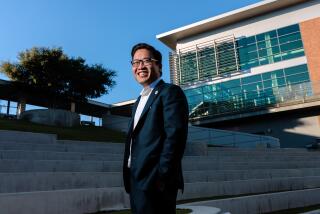School Official Who Criticized District Demoted : Education: Van Christopher claims the district siphoned $742,000 from a state grant for dropout-prevention programs he headed. His detractors have accused him of mismanagement.
The high-profile school administrator hired to run an innovative dropout-prevention program has lost his job in a dispute over funding and management of the project.
The school board has removed Van Christopher as director of alternative education for the Compton Unified School District. Christopher--who supervises a $1-million-a-year program for returned dropouts, problem students and teen-age parents--has been demoted to assistant principal at Roosevelt Middle School.
Christopher’s critics said he mismanaged a program that was once touted as an exciting and vital component of the district’s efforts to reverse a high dropout rate and disappointing student achievement. Christopher said he lost his job as retalia tion for publicly criticizing district officials and for alleging that they illegally siphoned money from his programs.
Board President John Steward said that he was displeased with Christopher’s performance, but also characterized Christopher’s removal as a budget decision. The job shuffle will reduce Christopher’s salary by about $23,000.
The district recently approved emergency budget cuts that included about 60 layoffs of non-teaching employees. Christopher’s reassignment was among about 20 administrative job changes approved Tuesday as part of the reduction.
Board member Amen Rahh criticized Christopher’s removal.
“We are always complaining that one reason our achievement scores are down is that we have students with special problems,” Rahh said. “We brought Van Christopher in to develop a program for students with special needs, and then they dismantle it.
“We will return to just warehousing students rather than providing the services necessary to get them into back into a regular school.”
Christopher will be replaced by Elizabeth Norwood, a longtime district administrator who was working as his assistant.
His departure leaves in limbo a much-debated program that was already struggling and behind schedule. Christopher joined the district in July, 1990, to run a program he envisioned while working as an administrator at a Watts middle school.
He wanted to create three new alternative high schools. One school would be for teen-age parents. The second would be for students who disliked traditional high schools or who were starting to have problems at their high school. The third was to be for students returning from probation or the streets or those who had serious attendance or discipline problems.
As recently as Sept. 22, the school board reaffirmed its commitment to his plan, voting 6 to 1 to accept a $742,000 state grant to help fund the schools.
But at the time, the district was also in the middle of a budget crisis.
On Sept. 30, the school board approved $4.9 million in cuts under pressure from the county Office of Education. The school board had to approve reductions or risk losing control of district finances, Steward said.
Christopher said the district then illegally transferred the grant money for his program to the general fund, which is used to pay most district salaries and bills.
The current budget deceives the county, he said, by improperly using grant money to inflate the general fund. The district is also deceiving the state, he added, by slashing a program it pledged to expand.
“When the district took the money from the state, the whole idea was to staff the (dropout prevention) program,” Christopher said. “The state gave us the money on the understanding that we would have 26 teachers. Instead, we have 10.”
State officials said they did not have enough information to comment on Christopher’s allegations. But, in general, money that is not used as intended must be returned to the state, they said.
Board member Rahh has also raised questions about whether the district handled the grant properly, but other district officials denied any wrongdoing.
The grant money is listed in the general fund because that is the account that holds all of the program’s funding, Associate Supt. Elisa Sanchez said. The money would never be used for anything but the intended purpose, she added.
Christopher’s charges go beyond the alleged siphoning. He also challenged the recently approved districtwide employee layoffs and transfers because he said they are based on an illegal budget.
Christopher is entitled to an administrative review of his allegations, a review that must take place before he could file suit against the district, said Frank Bazadier, his attorney.
The review could take months, however, and Christopher said he wants to stop the layoffs and retrieve funding for his program as soon as possible, Bazadier said.
So on Christopher’s behalf, Bazadier filed suit in Los Angeles Superior Court last month against the district in the name of Christopher’s wife, Joan. The suit asks the court to halt district layoffs because the budget is unlawful.
The lawsuit will probably go to trial next month, attorneys said.
Christopher faulted the way the budget was drawn up and adopted as well as the budget itself. He said that the school board approved the budget the same night it was submitted and that there was no opportunity for the legally required public review.
Melanie Lomax, the attorney for the district, conceded that the board had to approve its final budget on short notice, but she said the district had no choice because it was under a county deadline. The public had ample opportunity to comment on the budget before its final approval, she said.
Christopher will leave a program that is nothing like what he envisioned. Instead of three fully staffed special high schools, two of the programs are combined on one site on 148th Street. The third is being run from a partially renovated campus on 118th Street.
“We do not have the staff that the new state program calls for,” said Assistant Supt. Riley Johnson, who oversees Christopher’s dropout-prevention programs.
“According to the instructions from the superintendent, we’re supposed to be running three small high schools,” Johnson said. “According to the staff, it’s impossible to do right now.”
The program’s annual budget--not counting the disputed grant--has declined from $1.7 million two years ago to $930,574 this year, he said.
Johnson declined to assess blame, but said: “We have turned students away as a result of being understaffed--between 200 and 300 students. They have to go back to the regular high school, or drop out.”
Associate Supt. Sanchez said students should not have been turned away. She said more teachers will be hired as soon as the enrollment grows enough to justify it. She said she is still hopeful about moving forward with the three small high schools.
Board President Steward was less optimistic. He faulted Christopher for designing a dropout-prevention program that was too expensive, even with the addition of the state grant.
“I have contended all along that the grant they were requesting was not sufficient to staff a comprehensive high school program,” he said.
More to Read
Start your day right
Sign up for Essential California for news, features and recommendations from the L.A. Times and beyond in your inbox six days a week.
You may occasionally receive promotional content from the Los Angeles Times.







